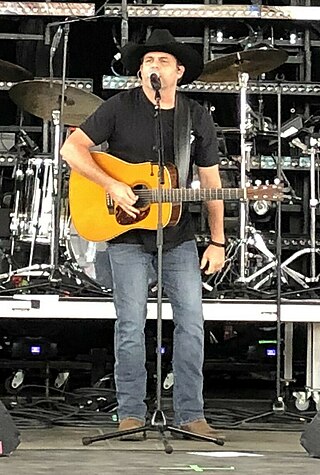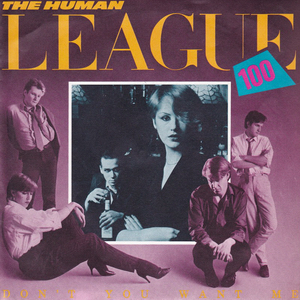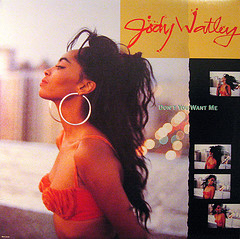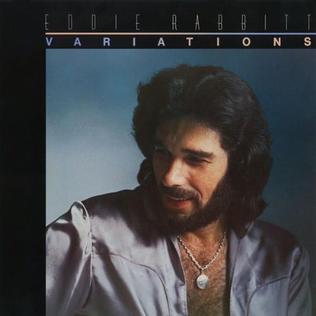Related Research Articles

Thomas Rhett Akins Sr. is an American country music singer and songwriter. Signed to Decca Records between 1994 and 1997, he released two albums for that label, followed by 1998's What Livin's All About on MCA Nashville. Friday Night in Dixie was released in 2002 on Audium Entertainment. Overall, his albums have accounted for fourteen singles on the Billboard Hot Country Songs, including the number one "Don't Get Me Started" from 1996.

"Don't You Want Me" is a song by British synth-pop group the Human League. It was released on 27 November 1981 as the fourth single from their third studio album, Dare (1981). The band's best known and most commercially successful song, it was the best selling UK single of 1981, that year's Christmas number one, and has since sold over 1,560,000 copies in the UK, making it the 23rd-most successful single in UK Singles Chart history. It topped the Billboard Hot 100 in the US on 3 July 1982, where it stayed for three weeks.

"1999" is a song by American musician Prince, the title track from his 1982 album of the same name. Originally peaking at number 44 on the Billboard Hot 100, a mid-1983 re-release later reached number 12 in the US, while a January 1985 rerelease, a double A-side with "Little Red Corvette", later peaked at number 2 in the UK.

"I Don't See Me in Your Eyes Anymore" is a popular song, written by Bennie Benjamin and George David Weiss and published in 1949. The song was popularized that year by Gordon Jenkins and His Orchestra and by Perry Como.

"Don't You (Forget About Me)" is a song by the Scottish rock band Simple Minds, released as a single in 1985. It was written and composed by the record producer Keith Forsey and the guitarist Steve Schiff for the film The Breakfast Club (1985). Simple Minds initially declined to record it, preferring to record their own material, but accepted after several other acts also declined.

"Love Don't Live Here Anymore" is a song written by Miles Gregory and originally recorded by Rose Royce. It was produced by former Motown songwriter and producer Norman Whitfield for Whitfield Records. Lead vocals were sung by Gwen Dickey and the song was released as the second single from their third studio album Strikes Again. The song was developed as a result of producer Whitfield's interest to work with Paul Buckmaster, the British arranger and composer. Together they asked songwriter Miles Gregory to write a song for them. Gregory's undergoing medical care for his deteriorating physical health became the inspiration behind the song. "Love Don't Live Here Anymore" incorporated the use of the Pollard Syndrum TwinDrum, and was one of the first songs to effectively use the sound reverbs of the instrument. The song was mainly recorded at music contractor Gene Bianco's house, where Dickey was present during the recording.

"Not for You" is a song by the American rock band Pearl Jam, released in February 1995 as the second single from the band's third studio album, Vitalogy (1994). Although credited to all members of Pearl Jam, it was primarily written by vocalist Eddie Vedder. The song peaked at number 12 on the US Billboard Album Rock Tracks chart and became the band's fourth top-10 single in New Zealand. It was later included on Pearl Jam's 2004 greatest hits album, rearviewmirror .

"Don't You Want Me" is a song by American singer Jody Watley from her 1987 eponymous debut studio album. It was released in August 1987, by MCA Records as the album's third single. The song was produced by Bernard Edwards and written by Franne Golde, David Paul Bryant and Watley.

"Don't Bring Me Down" is a song composed by Gerry Goffin and Carole King and recorded as a 1966 hit single by the Animals. It was the group's first release with drummer Barry Jenkins, who replaced founding member John Steel as he had left the band in February of that year.

"Don't Touch Me" is a song written by Hank Cochran. It was originally written for and recorded by American country artist Jeannie Seely. The song was released as a single on Monument Records in March 1966 and became a major Billboard country hit. "Don't Touch Me" became Seely's signature song and her biggest hit as a solo artist. It would later appear on her debut studio album and be re-recorded by Seely in later years.
Underground Sunshine was an American psychedelic rock band from Montello, Wisconsin. The group's only hit single came in 1969 with their cover of The Beatles' "Birthday".

Variations is the fourth studio album by American country music artist Eddie Rabbitt. It was released in 1978 under the Elektra Records label. The album produced three singles: "Hearts on Fire", which peaked at number two on the country charts, and two country number one hits: "You Don't Love Me Anymore", which also peaked at 18 on Adult Contemporary charts; and "I Just Want to Love You". "Kentucky Rain", a song co-written by the artist and originally recorded by Elvis Presley in 1970, was also included on the album.

"I Know (You Don't Love Me No More)" is an R&B song written and recorded by American singer Barbara George, released as her debut single in 1961. It became her signature song and her only major hit in United States, reaching No.1 on the Billboard R&B singles chart and No.3 in the Hot 100. It was later covered by various artists, inducing Fats Domino, Cher, Ike & Tina Turner, and Bonnie Raitt. A Spanish version by Marisela topped Billboard's Latin chart in 1988. The Shirelles borrowed the melody of "I Know" for their 1963 cover of "Everybody Loves A Lover".

"You Don't Love Me Anymore" is a song written by Alan Ray and Jeff Raymond, and recorded by American country music artist Eddie Rabbitt. It was released in May 1978 as the second single from the album Variations. The song was Rabbitt's second number one on the country chart. The single stayed at number one for one week and spent a total of ten weeks on the country chart.
American country music artist Crystal Gayle has released 15 music videos and 68 singles, including six as a collaborative artist, four as a featured artist, and six promos. Gayle's debut single was 1970's "I've Cried " via Decca Records, which reached number 23 on the Billboard Hot Country Singles chart. Encouraged by her sister to develop her own musical style, Gayle signed with United Artists Records where she began recording country pop material. That year "Wrong Road Again" reached number 6 on the country chart, launching several major hits including "I'll Do It All Over Again" and her first #1 hit, "I'll Get Over You". She released "Don't It Make My Brown Eyes Blue" in 1977 which became her signature song and brought her crossover pop success. It topped the country chart, reached number 2 on the Billboard Hot 100, and became an international hit. Its success elevated her career and was followed by three more number-one country singles: "Ready for the Times to Get Better", "Why Have You Left the One You Left Me For", and the top-twenty pop hit "Talking in Your Sleep".

The singles discography of Connie Smith, an American country artist, consists of 48 singles, one music video and one additional charting song. After signing with RCA Victor Records in 1964, Smith released her debut single in August entitled "Once a Day". The song topped the Billboard Magazine Hot Country Singles chart by November and held the position for eight weeks, to date being the longest running song at number one by a female country artist. The single's success launched Smith into stardom, making Smith one of the decade's most successful female artists. The follow-up single "Then and Only Then" reached #4 on the country singles chart, while its flip side went to #25 on the same chart. All of Smith's singles released between 1965 and 1968 reached the top 10 on the Billboard country songs chart, including "If I Talk to Him", "Ain't Had No Lovin'", and "Cincinnati, Ohio". By 1969 Smith felt highly pressured from her career and cut back on promoting singles. Smith's chart success slightly declined because of this, with songs like "Ribbon of Darkness" (1969) and "Louisiana Man" (1970) only reaching the top 20. Other singles continued to peak within the top 10 including "I Never Once Stopped Loving You" (1970) and "Just One Time" (1971).

"So You Don't Have to Love Me Anymore" is a song recorded by American country music artist Alan Jackson. It was released in January 2012 as the second single from Jackson's album Thirty Miles West. The song was written by Jay Knowles and Jackson's nephew, Adam Wright. The song was nominated for Best Country Song at the 55th Annual Grammy Awards.

The discography of American country music artist Carly Pearce consists of four studio albums, one live album, one extended play, nine singles, 14 promotional singles, nine music videos and 18 album appearances. Before being signed to a recording contract, Pearce contributed her vocals to several albums of bluegrass music in the 2000s. In 2016, she collaborated with the Josh Abbott Band on the single "Wasn't That Drunk". It reached number 37 on the Billboard Country Airplay chart the same year.

The singles discography of American country music artist Lynn Anderson contains 72 singles, three promotional singles, one charting B-side, two music videos and nine other song appearances. She signed her first recording contract with Chart Records in 1966. The following year, her single "Ride, Ride, Ride" debuted on the Billboard Hot Country Singles chart. Also in 1967, her single "If I Kiss You " became her first major hit when it reached number five on the country singles chart. Anderson had a series of hits that reached the top ten and 20 during the 1960s including "Promises, Promises" (1969), "No Another Time" (1968), "Big Girls Don't Cry" (1968) and "That's a No No" (1969).

"The Way I'm Livin'" is a song written by Adam Wright and originally recorded by The Wrights as "The Way That I'm Living" for their 2010 album Red and Yellow, Blue and Green. It was later recorded by American country music artist Lee Ann Womack. It was issued as the lead single to her studio album, also titled The Way I'm Livin', in May 2014 via Sugar Hill Records and Caroline Records. Despite having little commercial success, the song received positive reviews from critics.
References
- ↑ Allmusic chart history
- ↑ Allmusic song info
- ↑ Whitburn, Joel (1992). The Billboard Book of Top 40 Hits (Revised and Enlarged 5th ed.). New York: Billboard Books. p. 436. ISBN 0823082806 . Retrieved March 6, 2023.